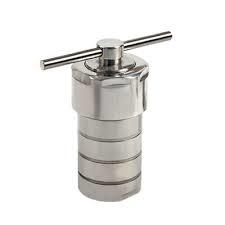The Critical Role of Stainless Steel Autoclave Reactors in Advancing Pharmaceutical Development
Release time:
2025-05-27
The Critical Role of Stainless Steel Autoclave Reactors in Advancing Pharmaceutical Development Introduction to Stainless Steel Autoclave Reactors In the pharmaceutical industry, the development of drugs and therapies relies heavily on advanced technology and precision equipment. One of the most significant pieces of equipment in this landscape is the **stainless steel autoclave reactor**. These r
The Critical Role of Stainless Steel Autoclave Reactors in Advancing Pharmaceutical Development
Introduction to Stainless Steel Autoclave Reactors
In the pharmaceutical industry, the development of drugs and therapies relies heavily on advanced technology and precision equipment. One of the most significant pieces of equipment in this landscape is the **stainless steel autoclave reactor**. These reactors serve a pivotal role in the synthesis of active pharmaceutical ingredients (APIs) and other essential compounds. In this article, we will delve into the various aspects of stainless steel autoclave reactors, their significance, and their broad applications in pharmaceutical development.

Understanding the Functionality of Autoclave Reactors
What is an Autoclave Reactor?
An autoclave reactor is a specialized vessel designed to perform chemical reactions under controlled temperature and pressure conditions. The use of stainless steel as the primary material for these reactors provides several advantages, including durability, resistance to corrosion, and the ability to withstand high-pressure environments.
How Autoclave Reactors Work
Autoclave reactors operate by creating an environment where chemical reactions can occur more efficiently. By elevating the temperature and pressure, the kinetics of the reactions can be enhanced, leading to faster production times and improved yields of desired products. The precise control of these variables is essential in ensuring product consistency and compliance with safety regulations.
The Importance of Stainless Steel in Autoclave Design
Corrosion Resistance and Durability
Stainless steel is the material of choice for autoclave reactors due to its superior **corrosion resistance**. In pharmaceutical applications, where reactive substances are often involved, the integrity of the reactor is paramount. The longevity of stainless steel autoclaves ensures that they can endure the rigorous cleaning processes required to maintain sterile environments.
Thermal Conductivity and Strength
Another key benefit of using stainless steel is its excellent **thermal conductivity**. This characteristic allows for more uniform heating and cooling processes, critical in maintaining the desired reaction conditions. Additionally, stainless steel's strength facilitates the construction of reactors that can handle the high pressures associated with certain reactions without compromising safety.
Applications of Stainless Steel Autoclave Reactors in Pharmaceutical Development
Active Pharmaceutical Ingredient (API) Synthesis
One of the primary applications of stainless steel autoclave reactors is in the synthesis of active pharmaceutical ingredients. The controlled environment provided by these reactors allows for complex reactions to occur, enabling the creation of high-purity APIs critical for effective drug formulations.
Formulation Development
In addition to API synthesis, stainless steel autoclave reactors are utilized in the formulation development phase. The ability to mix, dissolve, and react various components under strict temperature and pressure conditions ensures that the final product meets the necessary pharmaceutical standards.
Clinical Trials and Pilot Production
Stainless steel reactors are also instrumental during clinical trials and pilot production runs. Their robust design and capacity for precise control make them ideal for producing small batches of drug candidates to assess safety and efficacy before large-scale manufacturing.
Benefits of Using Stainless Steel Autoclave Reactors in Pharma
Enhanced Product Quality
The use of stainless steel autoclave reactors contributes significantly to enhanced product quality. By maintaining stringent control over reaction conditions, manufacturers can ensure that the resulting compounds have consistent properties and meet regulatory requirements.
Increased Efficiency and Reduced Production Times
Stainless steel autoclave reactors enable quicker reaction times due to their ability to maintain optimal conditions. This efficiency leads to reduced production timelines, allowing pharmaceutical companies to bring new drugs to market faster.
Compliance with Regulatory Standards
In the highly regulated pharmaceutical industry, compliance with standards set by authorities such as the FDA and EMA is essential. Stainless steel autoclave reactors are designed to meet these stringent requirements, ensuring that the manufacturing processes are both safe and compliant.
Challenges and Considerations in Using Stainless Steel Autoclave Reactors
Cost Implications
While stainless steel autoclave reactors offer numerous benefits, the initial investment can be substantial. Pharmaceutical companies must consider the long-term benefits against the upfront costs, particularly for smaller operations.
Maintenance and Cleaning Requirements
Maintaining stainless steel autoclave reactors requires a rigorous cleaning protocol to prevent contamination. This necessitates a thorough understanding of the materials and cleaning agents appropriate for stainless steel to avoid damage.
The Future of Stainless Steel Autoclave Reactors in Pharma
Technological Advances and Innovations
The future of stainless steel autoclave reactors looks promising as technological innovations continue to emerge. Advancements in automation and monitoring technologies are expected to enhance the efficiency and precision of these reactors, further solidifying their role in pharmaceutical development.
Integration with Sustainable Practices
As the pharmaceutical industry moves towards more sustainable practices, stainless steel autoclave reactors can play a vital role in minimizing waste and energy consumption. Their durability and recyclability align with the industry's shift towards environmentally friendly solutions.
FAQs about Stainless Steel Autoclave Reactors in Pharmaceutical Development
1. What are the primary materials used in autoclave reactors?
The primary material used in autoclave reactors is stainless steel due to its corrosion resistance, durability, and ability to withstand high pressures and temperatures.
2. How do stainless steel autoclave reactors ensure product quality?
By maintaining controlled temperature and pressure conditions, stainless steel autoclave reactors promote consistent chemical reactions, resulting in high-quality products that meet regulatory standards.
3. What are the key applications of stainless steel autoclave reactors?
Stainless steel autoclave reactors are primarily used in API synthesis, formulation development, and during clinical trials and pilot production runs.
4. What challenges do manufacturers face with stainless steel autoclave reactors?
Manufacturers may encounter challenges such as high initial costs and stringent maintenance and cleaning requirements to ensure compliance and prevent contamination.
5. What is the future outlook for stainless steel autoclave reactors in the pharmaceutical industry?
The future of stainless steel autoclave reactors includes advancements in technology, increased automation, and integration with sustainable practices, enhancing their role in pharmaceutical development.
Conclusion
Stainless steel autoclave reactors are indispensable tools in the pharmaceutical development landscape. Their unique properties and capabilities allow for efficient and safe chemical processes, ultimately leading to the creation of high-quality drugs and therapies. As the industry continues to evolve, the role of these reactors will be vital in meeting the demands of modern pharmaceutical manufacturing while adhering to stringent regulatory standards. Embracing innovations and sustainable practices will ensure that stainless steel autoclave reactors remain at the forefront of pharmaceutical development for years to come.
Latest News
Exploring the Benefits and Applications of Stainless Steel Autoclave Reactors in Life Sciences
Stainless steel autoclave reactors are essential instruments in the life sciences sector, particularly for applications requiring high-pressure and high-temperature conditions. These reactors are designed to facilitate chemical reactions, biological experiments, and material syntheses while ensuring safety and effectiveness. Their robust construction from stainless steel offers numerous advantages
2025-05-28
The Critical Role of Stainless Steel Autoclave Reactors in Advancing Pharmaceutical Development
The Critical Role of Stainless Steel Autoclave Reactors in Advancing Pharmaceutical Development Introduction to Stainless Steel Autoclave Reactors In the pharmaceutical industry, the development of drugs and therapies relies heavily on advanced technology and precision equipment. One of the most significant pieces of equipment in this landscape is the **stainless steel autoclave reactor**. These r
2025-05-27
Understanding the Benefits and Applications of Stainless Steel Autoclave Reactors in Life Sciences
Stainless steel autoclave reactors are essential tools in various scientific and industrial processes. They are specifically designed to withstand high pressures and temperatures, making them ideal for conducting chemical reactions that require strict control of conditions. One of the primary advantages of using stainless steel in these reactors is its exceptional resistance to corrosion, which is
2025-05-26
Why You Should Consider High Pressure Autoclave Reactors for Your Next Project
The Unmatched Efficiency of High Pressure Autoclave Reactors High pressure autoclave reactors have revolutionized the chemical engineering landscape, making them indispensable in various industries, including pharmaceuticals, polymers, and specialty chemicals. With their capability to operate under elevated pressures and temperatures, these reactors facilitate unique chemical reactions that trad
2025-05-25
Understanding High Pressure Autoclave Reactors: Essential Equipment for Chemical Processing
High pressure autoclave reactors are specialized vessels designed to facilitate chemical reactions under elevated pressure and temperature conditions. These reactors are essential in the chemical industry, particularly for processes that require the synthesis of materials where traditional reactors cannot provide the necessary conditions. They are widely used in a variety of applications, includin
2025-05-24
Exploring the Versatility of High Pressure Autoclave Reactors in Industrial Applications
Introduction to High Pressure Autoclave Reactors High pressure autoclave reactors are essential tools in the chemical industry, enabling various processes that require extreme conditions. These reactors facilitate chemical reactions at elevated pressures and temperatures, optimizing reaction rates and product yields. Their versatility makes them suitable for numerous applications, from pharmaceuti
2025-05-23








